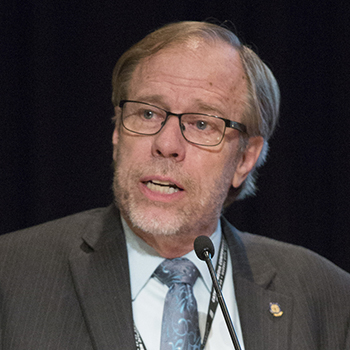 Greg Erlandson, director and editor-in-chief of Catholic News ServiceWhen Catholic News Service posted a short video of the Pennsylvania attorney general’s Aug. 14 news conference announcing a grand jury report on clergy sexual abuse in six dioceses, its editors had to add a warning about the graphic language viewers would hear.
Greg Erlandson, director and editor-in-chief of Catholic News ServiceWhen Catholic News Service posted a short video of the Pennsylvania attorney general’s Aug. 14 news conference announcing a grand jury report on clergy sexual abuse in six dioceses, its editors had to add a warning about the graphic language viewers would hear.
The actual 900-page report chronicling 70 years of child sexual abuse by 301 priests is much, much worse. There are images of rape, perversion and blasphemy that will be hard to excise from a reader’s imagination, vile and disgusting acts that have shattered the lives and faith of the more than 1,000 victims and their families.
Harder still is to understand how some leaders could have known about these acts of profound betrayal and not have been enraged into action to excise permanently such evil from our Church.
And this goes to the dark heart of this crisis: That men of the cloth would sin so grievously against the most defenseless in their flocks, and that men of the cloth would fail to respond appropriately.
The clergy sexual abuse crisis has been, and remains today, ultimately a crisis regarding the responsibility of Church authorities. The profound distrust of institutions — law, science, education, government — that permeates our society permeates our Church as well. This distrust strikes at the heart of a hierarchical structure — that those who bear the most responsibility and most power have at times failed us. “Put not your trust in princes,” sang the psalmist. Indeed, many Catholics no longer do.
And yet we must not paint all bishops and priests today with the same brush that has tarred some. Many more bishops have met with victims, cried with them, and responded to their needs than in years past. Many more priests speak out forthrightly from their pulpits, addressing the scandals and encouraging those who have been hurt to come forward.
In the wake of the recent revelations involving Pennsylvania, Archbishop Theodore E. McCarrick and other allegations that have come to light involving seminaries, there are four take-aways from this horrible new chapter in the life of our Church.
First, the bishops today, as descendants of the apostles and descendants of those who previously occupied the positions they hold now, must convincingly demonstrate a spirit of repentance and recommitment. Their people, and society at large, are not looking for more generic apologies and corporate-sounding assessments of current performance. They must act boldly and concretely if their apologies are to be taken seriously.
Their recommitment must involve greater accountability and greater transparency. To do this, they must have the support of the Vatican. This won’t be easy. There are many bureaucratic and institutional forces that do not want the sins of the fathers to be exposed and that are blind to the great peril our Church is already in.
Second, many are calling for a greater role for the laity in investigations and in future decision-making. It is a tremendously positive development that lay boards have become involved in assessing abuse allegations. Past scandals documented in Pennsylvania so often involved only clergy in investigative and decision-making roles. The Church needs lay men and women to be actively involved in the purification and renewal of the Church.
There also should be a renewed appreciation for the role of the Church’s own media in informing and forming Catholics. At least 39 bishops have spoken out about the initial scandal involving Archbishop McCarrick, yet some dioceses no longer have effective communication tools to make sure that their people are hearing the voices of their bishops. Worse still would be if diocesan publications are tempted to avoid publishing news of these scandals, even though their secular counterparts are putting it on the front page. This destroys the credibility of Catholic media and further undermines the leadership of the bishop.
Third, we must acknowledge how much has changed since the scandals that rocked the U.S. Church in 2002. The Church now is far different from even 16 years ago. Extensive procedures for training young people, for background checks and for reporting violations have been put into place. Victims are much more likely to be treated with sympathy and their reports taken seriously. Since the Charter for the Protection of Children and Young People was implemented in 2002, it is estimated that the Church has spent $4.4 billion on these procedures as well as on payouts to victims and their attorneys. No other social institution even comes close to this level of commitment.
Which brings us to the fourth point. Solving the problem of sexual abuse and accountability in the Church will not solve the problems of sexual abuse and accountability in society. There are an estimated 60,000 cases of child abuse in the United States each year. Multiplied over a span of 70 years, this number would be horrifying.
Abuse in the larger society is no excuse for the 301 priests (about 5 percent all priests who served in those dioceses over a period of 70 years) who are guilty of abusing at least 1,000 victims. Yet if any good is to come out of this long tragedy, it may be that the Church — humiliated and scorned as it now is — may be able at some point to contribute to a much greater healing that needs to take place in our country and our world.
Erlandson is director and editor-in-chief of Catholic News Service.